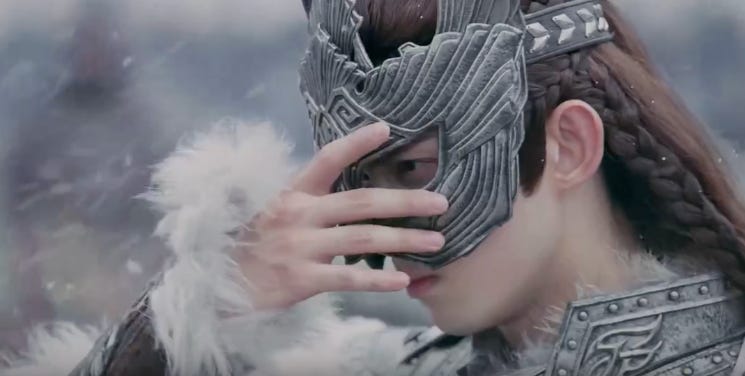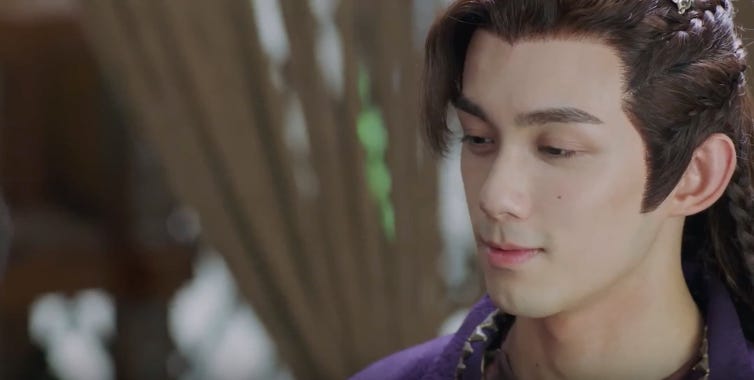The Long Ballad (2021) Heroes Journey
Alright, alright… I admit it, I’m hooked. So hooked that I blazed through all the remaining available episodes in 3 days. I spoke too soon undoubtedly but what can I say, the show gets progressively better and these days I think this show has the potential to be one of the year’s best dramas from the mainland. I had this unfathomable notion that You Are My Hero was going to be it for me but yeah… it’s only April and the year is young.
As the other half and I concur, this show has resonances of the brilliant Nirvana in Fire (2015). Of course it doesn’t have Nirvana’s complexity and brooding melancholy. While politics is involved, for the most part it’s a straightforward hero’s journey with plenty of nice youthful energy expended. Plus there’s a more concerted focus on romance here. In fact there are multiple romances up for grabs whereas Nirvana barely had one.
Romance as a key element is seldom a deal breaker for me. How it’s achieved is what matters. This show gets it right so far. I’m partial to the leads even while others are drawn to the more tropey romcom-ish secondary pairing. There’s surely something for everyone on the menu. A good romance it seems to me is properly integrated into character development rather than an appenditure just to … as I often cynically say … appeal to a particular demographic. However, I am inclined to think that the success of the show so far lies in its ability to pull together various period sub-genres like court politics and wuxia. Perhaps this is where it finds common ground with Nirvana.
Wu Lei is surprising in this. But maybe it’s just me that’s surprised because my expectations were low to begin with. He is certainly well-served by a decent script that is probably as in love with his character as I am. His Ashile Sun is a standout, an epitome of a kind of old-fashion noble warrior embodying qualities that are guaranteed to command respect from his men and win the love of a good woman. He is patient, he is kind and has the rare capacity of looking at things objectively — an invaluable asset for a man with enemies from within and without A wonderful insight to his character is offered by the Eastern Turkic Khan (not exactly my favourite character) to his less competent successor, She’er. “A’Sun’s greatest ability is not in commanding troops in battle but that he is able to win the hearts of the Eagle battalion.” When She’er later tries unsuccessfully to persuade Sun from leaving the steppes to search for Changge, he realises why he has consistently lost to the better man. It finally dawns on him that Sun’s complete dedication to people that he cares about is what distinguishes him.
In a time of war, Sun stands apart from his people. He takes up an offer of surrender and keeps his word. Yes he plays these little zero sum games with Changge to broker a deal to get her to leave the city. But I believe that he always intended to keep faith with the governor in their original arrangement. The fact that he likes her and respects her independence has no bearing on the matter. No, none at all. In all seriousness though, his priority right from the start was her survival not her love. Perhaps it’s a good strategy for courtship but then it is rather difficult to have any kind of a relationship with a dead woman.
Li Changge, a hard sell at the beginning, is growing on me especially after her time in Yuzhou. Overnight, the neverending praise showered on her thus far seem more warranted. It hits home finally that the revenge business is not a fruitful one. The bitter pill in all her encounters seems to be only tragedy can bring people to the end of themselves and learn lessons that can’t be taught in a classroom or a book. Hers is truly a bumpy road paved with obstacles of many kinds. She’s learning… little by little… to look at a much bigger road map than her “petty” revenge scheme against her uncle. There’s bigger fish to fry which includes a possible invasion from the Ashile tribe right at her doorstep. To her credit, Changge has a strong sense of country if not of king so she throws all her efforts in assisting the governor of Yuzhou, Gongsun Heng who becomes a mentor. This becomes an object lesson in the school of hard knocks. Horrifying and brutal in its details. But it is part of her hero’s journey to make a hero out of her. Life takes everything from her and brings her to her knees. To add insult to injury, she’s dragged off to the steppes in humiliation as a slave. Unknown to her this is part of Sun’s plan to keep her close by and out of trouble. But trouble soon comes knocking.
More than the romance(s) the show's biggest selling point is its presentation of different perspectives in a given situation. One of the biggest crises involving the leads is a perfect storm of personal choices and opportunism. Apportioning blame is a useless exercise. The narrative seldom takes sides in the way the viewers do. All it does is delve into motivations and we're left to ponder the aftermath and ramifications. I'm actually surprised at times by the complexity of various confrontations and events after the fact. Moreover, I’ve enjoyed added insight watching this with the other half because he occasionally has a different perspective. Much of the show is made more palatable because it doesn't condone everything that the lead character does.






